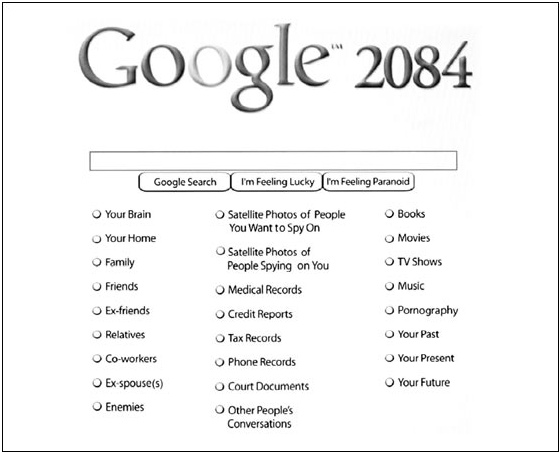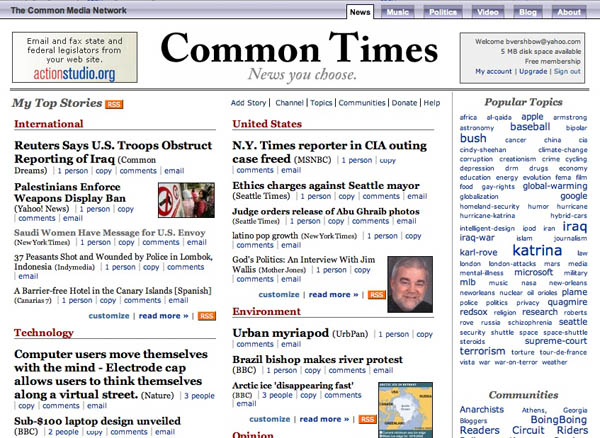Google as big brother: “Op-Art” by Randy Siegel from today’s NY Times.

Category Archives: algorithm
human versus algorithm
I just came across Common Times, a new community-generated news aggregation page, part of something called the Common Media Network, that takes the social bookmarking concept of del.icio.us and applies it specifically to news gathering. Anyone can add a story from any source to a series of sections (which seem pre-set and non-editable) arranged on a newspaper-style “front page.” You add links through a bookmarklet on the links bar on your browser. Whenever you come across an article you’d like to submit, you just click the button and a page comes up where you can enter the metadata like tags and comments. Each user has a “channel” – basically a stripped-down blog – where all their links are displayed chronologically with an RSS feed, giving individuals a venue to show their chops as news curators and annotators. You can set it up so links are posted simultaneously to a del.icio.us account (there’s also a Firefox extension that allows you to post stories directly from Bloglines).

Human aggregation is often more interesting than what the Google News algorithm can turn up, but it can easily mould to the biases of the community. Of course, search algorithms are developed by people, and source lists don’t just manufacture themselves (Google is notoriously tight-lipped about its list of news sources). In the case of something like Common Times, a slick new web application hyped on Boing Boing and other digital culture sites, the communities can be rather self-selecting. Still, this is a very interesting experiment in multi-player annotation. When I first arrived at the front page, not yet knowing how it all worked, I was impressed by the fairly broad spread of stories. And the tag cloud to the right is an interesting little snapshot of the zeitgeist.
(via Infocult)
the database of intentions
Interesting edition of Open Source last week on “Google Sociology” with David Weinberger and John Battelle, author of the just-published “The Search: How Google and Its Rivals Rewrote the Rules of Business and Transformed Our Culture”. Listen here.
Weinberger has some interesting things to say about Google (and the other search engines) as “publishers.” I have some thoughts on that too. More to come later.
Battelle has done a great deal of thinking on search from a variety of angles: the technology of search, the economics of search, and the more esoteric dimensions of a “search” culture. He touches briefly on this last point, laying out a construct that is probably treated more extensively in his book: the “database of intentions.” By this he means the archive, or “artifact,” of the world’s search queries. A picture of the collective consciousness formed by the questions everyone is asking. Even now, when logged in to Google, a history of all your search query strings is kept – your own database of intentions. The potential value of this database is still being determined, but obvious uses are targeted advertising, and more relevant search results based on analysis of search histories.
As regards the collective database of intentions, Battelle speculates that future advances in artificial intelligence will likely draw on this enormous crop of information about how humans think and seek.
